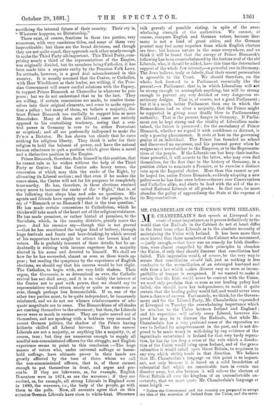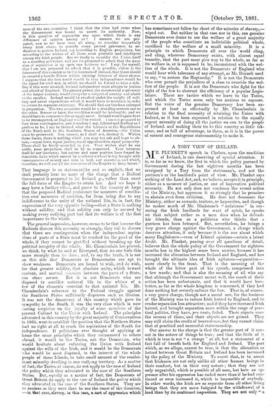HR. CHAMBERLAIN ON THE UNION WITH IRELAND.
Nirt. CHAMBERLAIN'S first speech at Liverpool is an event of some importance, as it proves definitively to the world that the Radicals in the Cabinet do not at heart differ in the least from other Liberals as to the absolute necessity of
maintaining the Union with Ireland. It has been more than once hinted that those members of the Cabinet who announced, —justly enough,—that force was no remedy for Irish disaffec-
tion, were almost compelled by their principles to abandon
the Union, if only they should discover that conciliation had failed. This impression would, of course, be the very way to
secure that conciliation should fail, just as nothing is less conducive to the reconciliation of an estranged husband and wife than a law which makes divorce easy so soon as incom- patibility of temper is recognised. If we wanted to make it certain that the Irish would never be content with the Union,
we need only proclaim that so soon as our healing policy had failed, she should have her independence to make it quite certain that the healing policy would fail, and would never even have a chance of success. Fortunately, we think, for the Govern- ment and for the Liberal Party, Mr. Chamberlain expounded at Liverpool on Tuesday the overwhelming importance which he attaches to the Union between Ireland and England ; and his exposit;on will satisfy every Liberal, however dis- posed he may be to distrust the Radicals, that while Mr. Chamberlain has a very profound sense of the reparation we owe to Ireland for misgovernment in the past, and is not dis- posed to be made weary in well-doing by any evidence of the ingratitude entertained in Ireland for that very tardy repara- tion, he has far too deep a sense of the ruin which a dissolu- tion of the Union would bring upon Ireland, and of the grave calamities it would entail upon Great Britain, to acquiesce in any step which visibly tends in that direction. We believe that Mr. Chamberlait's language on this point is so import- ant, not only because it is based on a solid foundation of substantial fact which no conceivable turn in events can dissolve away, but also because it will relieve the electors of Great Britain all over the kingdom of an uncomfortable un- certainty, that we must quote Mr. Chamberlain's language at some length :— "Unless the Government and the country are prepared to accept the idea of the secession of Ireland from the Union, and the sever-
ance of the two countries, I think that the time had come when the Government was bound to assert its authority. Now, is this question of separation one upon which there is any difference of opinion among us ? I assume we are pre- pared, now as we have been all along, to consider impartially every Irish claim, to remedy every proved grievance, to en- deavour to govern Ireland, not according to English prejudices, but according to the wishes of all those most patriotic and intelligent among the Irish people. Are we ready to consider the Union itself as a standing grievance, and are we prepared to admit that the ques- tion of separation is an open one between us? I say, for myself, that I am not prepared to admit that it is possible, either in the interests of this country or in the interests of Ireland, that there should be created a hostile Power within striking distance of these shores. I suppose that the first result would be that independence would be the signal for civil war, in which we should be forced to take a side. But if this were avoided, Ireland independent mast always be jealous and afraid of England. The greater power, the commercial supremacy of the larger country, would always be a subject of anxiety and alarm to the smaller. Ireland would be crushed under the weight of mili- tary and naval expenditure which it would have to maintain in order to secure its separate existence. We should find our burdens enlarged in proportion. The two countries would be a standing menace one to the other. Sooner or later, the condition would be intolerable, and we should have to commence the struggle anew. Ireland would again have to be reconquered, or England would be ruined. I am not prepared to face these contingencies, and therefore I say, Liberal and Radical as I profess to be, I say to Ireland what the Liberals or the Republicans of the North said to the Southern States of America,—the Union must be preserved. You cannot, and shall not, destroy it. Within these limits, there is nothing which you may not ask and hope to ob- tain,—equal laws, equal justice, equal opportunities, equal prosperity. These shall be freely accorded to you. Your wishes shall be our guide, your prejudices shall be by us respected. Your interests shall be our interests ; but nature and your position have forged in- dissoluble links which cannot be sundered without being fraught with consequences of misery and ruin to both our countries, and which, therefore, we will use all the resources of the Empire to keep intact."
That language is so statesmanlike and so explicit, that we shall probably hear no more of the charge that a Radical Government is prepared to let Ireland go, rather than exert the full force of the Empire to retain her. And we hope it may have a further effect, and prove to the country at large that the proposed Radical preference for measures of concilia- tion over measures of coercion, far from being due to any indifference to the unity of the national life, is, in fact, the expression of the very opposite feeling—that a State is nothing without solidity, and that solidity can only be secured by making every outlying part feel that its welfare is of the first importance to the whole.
The general impression, however, seems to be that because the Radicals discern this necessity so strongly, they fail to discern that there are contingencies when the independent aspira- tions of parts of a State must be crushed for the good of the whole, if they cannot be gratified without breaking up the political integrity of the whole. Mr. Chamberlain has proved, we think, by what he said at Liverpool, that no one feels this more strongly than he does ; and, to say the truth, it is not on this side that Democrats or Democracies are apt to show weakness. Democrats are bound to wish, and do wish, for that greater solidity, that absolute unity, which inward content, and mutual cohesion between the parts of a State,
can alone secure. But it is not Democrats who are disposed to sacrifice national life to the whims of a few of the elements essential to that national life. Mr. Chamberlain's reference to the Federal struggle against the Southern States sufficiently disproves such an illusion. It was not the democracy of this country which gave its sympathy to the South, it was the very class which is now casting suspicion on the loyalty of some members of the present Cabinet to the Union with Ireland. The principles advocated in this country by the great majority of Conservatives in 1861, went to establish the position that the Northern States had no right at all to crush the aspirations of the South for independence. If politicians ever thought of applying at home the same principles which they recommend to others abroad, it would be the Tories, not the Democrats, who would hesitate about enforcing the Union with Ireland against the wills of the Irish, and it would be the Democrats who would be most disposed, in the interest of the whole people of these Islands, to take small account of the recalci- trant minority dwelling in one outlying territory. As a matter of fact, the Tories, of course, do not apply to the case of Ireland the policy which they advocated in the case of the Southern, Staters. But, equally as a matter of fact, the Democrats of Great Britain do apply to the case of Ireland the policy which they advocated in the case of the Southern States. They are. as anxisits as they were then to see the cause of the disunion,' —in that case, slavery, in this me, n sort, of qppression which'
has sometimes not fallen far short of the miseries of slavery,— wiped out. But neither in that case nor in this, can genuine Democrats ever desire to see the welfare of a great majority of the people who constitute an indivisible political whole, sacrificed to the welfare of a small minority. It is a principle to which Democrats all over the world cling, and cling, wherever Democracy exists, with almost equal tenacity, that the part must give way to the whole, so far as its welfare is, or is supposed to be, inconsistent with the wel- fare of the whole. It is not the Democrats of England who would hear with tolerance of any attempt, as Mr. Disraeli used to say, "to restore the Heptarchy." It is not the Democrats who ever permit the prejudices of a class to override the wel- fare of the people. It is not the Democrats who fight for the right of the few to obstruct the efficiency of a popular Legis- lature. These are tactics which we leave to the Tories, and which the Tories seem only too anxious to espouse. But the voice of the genuine Democracy has been ex- pressed at least as effectually by Mr. Chamberlain in relation to the final necessity of retaining the Union with Ireland, as it has been expressed in relation to the equally urgent necessity of doing all the justice we can to the people of Ireland, and making their tie to this country as little irk- some, and as full of advantage, to them, as it is in the power of earnest and courageous statesmanship to make it.



































 Previous page
Previous page